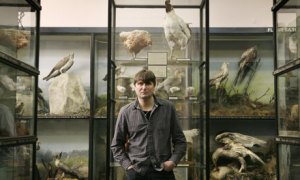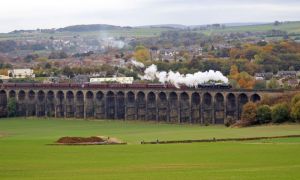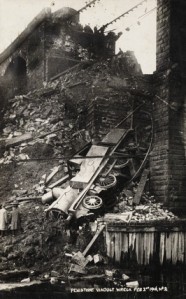As a matter of fact, I couldn’t resist this image of a Pennine poet among the display cases of the Tolson Museum in Huddersfield. The reason should become clear as we go along, but I warn you in advance that this is the third post I’ve written in the last two days (the other two for other cobweb spinners and weavers who’ve asked me to guest on their sites; I’m not sure when they’ll be posted, but I couldn’t be happier to be asked.)….however, all three involve a bit of reflection on the writing process as I know it, and the thing is, I fear they may start to bleed into each other, or run like watercolours, and I’ll lose the thread. Fingers crossed.
I’ve just noticed I’ve managed to stack three metaphors into three consecutive clauses in one sentence. Sorry about that.
I’ve been thinking about that question that writers of all kinds get asked: ‘Where do you get your ideas from?’ I’m not thinking of the business of what prompts you to recover them from the dusty, badly-curated bits of your memory and unconscious. That’s what writing workshops do for me. No, I’m thinking of the question of where it all comes from in the first place. What if you’ve had a pretty uneventful life? What if you’re not widely travelled. And why do we improvise on these first hand memories and on vicarious experience? James Britton memorably said it was because we never cease to long for more lives than we can actually live. So we read, we read, we watch films and television, we go to art galleries, we wander around cities, we walk through landscapes. We might even go into museums. I’m reminded that when I was doing a lacklustre MA in a lacklustre way for lacklustre reasons I had to write an essay about the ‘Writer as researcher’ and to reflect on the nature of the research I undertook in order to write poems. Where do I get my poems from? What are they about?
The more I look back, the more I see how one idea or notion will lead to another in ways that take me by surprise, and I accidentally stumble on information and images that find their way into poems….or become poems. And to be fair, how some of the books I read bleed into my writing. Here’s a confession. Every now and then I realise that I’ve hijacked another writer’s turn of phrase, or even come close to incorporating whole phrases and clauses into my writing. Not consciously. It’s as though they’ve morphed into ‘my’ thinking. John Prebble is one such. Wanting to make sense of crofters and Clearances inevitably took me to Prebble, and I find I’ve lifted a phrase about ghosts from ‘Glencoe’ that turns up, not much changed, in a poem called Boreraig, and another called A kind of history. And these are the ones I know about. It’s an odd thing, this ‘research’.
I’ve stumbled on stuff in Prebble, say, about Portugeses mercenaries fighting an awful rearguard on the slopes of Glen Shiel…why does it bother me? Why do I want to write about it, re-imagine it? Reading about the painter, John Waterhouse took me down sideroads of myth and legend, to Ovid, and then to Ted Hughes, and by another road to statues and sculptures, and thence to Queen Victoria’s journals, and the building of Nelson’s Column, and thence to his ships and his battles and his wounds. Vikings, the Spanish Civil War, crucifixion (did you know the sloping wooden ‘step’ on a cross is a suppadaneum?), Albert Pierrepoint, railway navvies, Mayhew’s street people………of late it’s been the history of maps, and, especially, Robert Macfarlane who has taken me back to the Vikings, to Everest, the geology of the Cairngorm. And people ask: where do you get your ideas from? As though that was problematic. The problem for me is knowing when to stop, to concentrate.
And so we come, by some indirection, to my guest for today, who writes about men who can hold ice, trains that fall from viaducts, fossilised trees, the folklore of fruit, the fears of geese, Pennine graveyards, Sicilian breakfasts and volcanoes…in short a poet who never fails to engage and delight me: Julie Mellor
While I was rereading her Poetry Business Pamphlet Competition winner Breathing through our bones (chosen by Carol Ann Duffy! Yes, it’s that good.) I realised what it was I liked so much about Julie’s writing…it’s that every poem is a surprise, that each one is unexpectedly different from the last, and at the same time the voice is reliably the same. And the other realisation is that there’s not a shred of ego, or self-consciousness. Just a genuinely curious delight in the unaccountable richness and diversity of things. But I’m forgetting my manners. If you’ve not met Julie Mellor before, then let me introduce you.
Julie was born in Penistone, (which, as you’ll notice, has a viaduct…always a commendable thing, and is also one of these towns where everyone is someone’s cousin twice removed) where she lives with her partner and her most treasured possession: her dog. After doing various jobs, including working in a shoe shop on London’s Oxford Street, and as an au pair in Sicily, she gained a degree in English at the University of Huddersfield. She went on to do an MA in Writing at Sheffield Hallam, followed by a PhD, which she completed in 2003. Her poems have appeared in magazines and anthologies including Ambit, Mslexia, The North and The Rialto. Breathing Through Our Bones was published in 2012, ‘Poems with a real ability to own their subject – whether spontaneous combustion or the collective thought of geese – and which remain to intrigue long after reading’ – says Carol Ann Duffy. I’m not about to argue with that.
I’ve known her for a few years as a regular at the Poetry Business writing days, which is where I’ve seen many of the poems in her pamphlet appear for their first airing in public. And thing is, they ‘stick’. They’re always memorable. Not just the subjects, but the turn of phrase, the exactness of images. Here’s a few examples, just so you tune in.
You’ll encounter The roots of lycopsid trees , the Bishop of Tours, St Martin who chose to live with geese, Joseph Prigg, aged thirteen, who died of injuries at work, four days before Christmas, 1869. Because here’s a poet who spends time (like Simon Armitage) in the Tolson Museum in Huddersfield, who is interested in churchyards and gravestones, and brings the dead to life and breathes through their bones. Anyone can be quirky and eccentric with their choice of subjects. Making them connect with our lives is another thing altogether, and that’s what her poetry does for me. It grabs my attention, too, with images that are surprising and true. I truly hate canal towpath walking, and this is why.
Each bridge is a bleak stone rainbow
and when the water is calm,
it mirrors the arch
to a circle, a giant gun barrel
we are propelled through, side by side.
There it is, the rainbow with no gold at the end, that endless perspective, the speed of its narrowing, and for me, the no-progress of walking, looking at it endlessly receding. Or, how about this: a kitchen whisk Like the winding gear at Dodworth pit. Or this: ice melt running through my fingers / as if I was squeezing it dry. I really like the paradox of that. Neat, concise, exact. Or this, about a beck in spate. Listen. I’m running late; / see the jolt in me…… ‘see’ where you’d expect ‘feel’; ‘see’ when you’ve just been told to ‘listen’. And so it goes. OK. I’ve made you wait. Time for complete poems. The first I’ve always liked for the swagger of taking on Heaney on his chosen ground (though, to be fair, I can’t imagine anyone less given to swaggering than Julie Mellor.)
Blackberries
We have darkened like the end of the year,
the knuckled hulls at our core
white as a maggot or a baby’s first tooth.
Clusters of sorcery, we store the sun.
The juice of us is a blue flame.
Even the wary fall for our frumenty smell.
Between children’s fingers we bleed black,
store our vengeance until Michaelmas,
when the devil unleashes himself in spit
and piss, and we rot like the underside
of hide buried in lime, lose ourselves
in softness, sink back into what we are,
almost fruit, almost tar, resist the creeping nights,
the toll of winter curfew, wait
in our thinned clusters like the eyes of the blind,
until eel worms eat at our ingangs,
hang on to the last, juice thick as oak bark liquor,
seasoned, vile,
then shrivel back to seed,
like the mole on the back of the neck
that marks you for hanging.
Isn’t this a witchy poem and isn’t it textured? Just read it aloud and relish the consonants, and the creepy resonance of maggots, eels, the mole that marks you for hanging. Poetry as enchantment ( thanks for that, Dana Gioia). The next one is more tender, and I like it because it illustrates the surprise you can look forward to as you turn a page in the pamphlet. This one was published in The North. (I can’t find which issue. Mea culpa)
Great Aunt Lucy
When I say I was hungry,
I’d already eaten the tiled hearth,
swallowed the coals in the scuttle
one by one, chewed the armchairs,
the cushions, all that wadding.
When I ate the television,
I felt the tube explode inside me.
My head swam. I was walking
on stilts, my slippers miles away,
small pink embellishments
at the end of my varicosed legs.
Eating the curtains took
the best part of a week.
I started with the nets; soft with dust
they went down the way
a christening shawl passes
through a wedding ring.
The curtains themselves I unpicked
like a moth, worked in from the corners,
followed the thread, like Ariadne
unwinding her ball of string.
When I’d done, the room
was full of grey light
and I saw myself properly
for the first time in years,
in an empty room, without my hat.
Gaia Holmes, another poet I like a lot, will do this kind of thing. A sort of surrealism that works because it stays deadpan, even as it piles the improbable on the implausible, and then turns round on itself in the ambiguities of a room full of grey light, and something that’s wistful, and bleak and comic, all at once. Lovely. Now, just one more. This one has been published in Ambit 219. I think it’s one of the few of Julie Mellor’s poems that are explicitly personal.
Propolis
I’m aware it’s the stuff of bee spit and wax,
that it turns soft when the sun warms the hive,
and the bees, busy with their work of sealing the gaps,
are animate and fondling in their movement.
In truth, it’s not propolis I’m talking about,
but those unwanted spaces where words land and rest.
Think of old windows, how the putty has hardened
under layers of paint so the glass rattles loose in the frame.
When I say it’s turning cold, remind you
to shut the door to stop the draft,
what I’m really saying is, here is my heart,
raw as lambs’ liver, leaking on a white plate.
It shouldn’t be so exposed. There shouldn’t be
all this quiet air around it.
What grabs me is that line..what I’m really saying is, here is my heart. It’s simple, or it seems simple.But it isn’t at all. And you can’t ignore it, plain and unadorned amongst all the analogies that dramatise that business of trying to find the right words when the plain words were the right ones after all. So there you are.
Julie Mellor asks a question in one of her poems Autobiography
How do I know about the price
of porter, about fleas in the mattress,
the pawning of ulsters –?
The answer is that she spends a lot of time in museums and churchyards and books and other people’s poems and lives and landscapes; because she has endless curiosity. That’s what research is like. And we could do a lot worse than follow the advice in the closing lines of Drawing the line
Look at these graves,
how they hold their names ready for us,
how we stoop to read with surprise
what, for centuries, has been lying at our feet.
Right; you’ve been quiet and attentive and I’m really pleased with you all. Off you go, and make sure you buy a copy of Breathing through our bones (Smith/Doorstop Books. 2012. £5.00). You can do it simply by following the link on this wordpress site. https://juliemellorpoetsite.wordpress.com/
I hope that’s right. In any case, Google her. We’re having another guest next week. As a matter of fact, another Yorkshire poet, and a man who knows the finer points of a whippet. Don’t be late. And remember: More haste, less speed.



Enjoyable & inspirational post & poems. Ahem … this is the right link for Julie – https://juliemellorpoetsite.wordpress.com/
LikeLike
Thanks for the correction, Elly. I’ll go and re-edit the post. I feel guilty, now. Waiter, and a fly in the soup. xxxx
LikeLike
It’s corrected now, Elly, and it works. Thank you.
LikeLike
Great post – shared it on the Twittersphere! xx
LikeLike
Thank you for that, Maria! Big hugs.
LikeLike